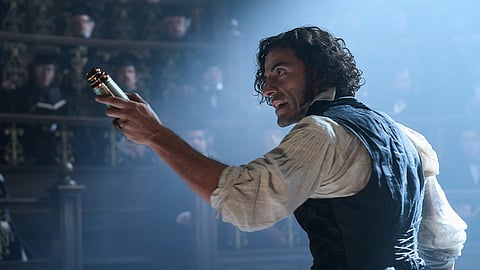Frankenstein Movie Review: Macabre, melancholic, moving
Frankenstein Movie Review: Macabre, melancholic, moving(3.5 / 5)
Upon discovering Victor Frankenstein’s creation, with his limbs and organs stitched together from several corpses and animated to life through the spark of science and lightning, his younger brother William asks, “Of all the parts that make that man, which one holds the soul?” Guillermo Del Toro’s adaptation of Mary Shelley’s Frankenstein chases that same question. In search for the “how” of life, maverick scientist Victor Frankenstein creates an immortal man, who endlessly ponders the “why” of his existence. He is the question itself made to flesh. And the fact that he cannot die is a poetic metaphor for humanity’s unending quest for the “why” to understand its existence. As for the matter of the soul and whether or not Frankenstein’s monster has it, or rather how he gains it, Del Toro examines it through a deeply meditative and poetic approach.
Director: Guillermo del Toro
Cast: Oscar Isaac, Jacob Elordi, Mia Goth, Christoph Waltz
Del Toro’s signature aesthetics have always been boldly excessive, like something pulled out of the dream of a classical painter with no material limitations. His fascination with teetering on the edge of beauty and the macabre, of the soft glow of sunlight on snow and the gory entrails of a corpse on display, lends itself to a wonderful visual grammar. Del Toro doesn’t seek to find contrast with such displays but to show you how beauty and ugliness, life and death, are woven together into the fabric of reality. The director’s signature aesthetics finds evocative visuals in such honesty. Del Toro’s vision is wonderfully elevated by immersive performances, with Jacob Elordi as The Creature and Oscar Isaac as Victor Frankenstein completely dissolving themselves in their respective roles. Elordi strikes the perfect balance between The Creature’s intimidating physicality and the childlike innocence at his heart. Isaac takes an interesting approach by indulging in classical acting, the kind of eccentricity, melodrama, and flamboyance seen in older films. Del Toro also takes a classical approach, which sometimes comes with a lack of subtlety. Did we really need to hear someone say, “No Victor, you are the monster,” when it has been amply established through several scenes with better finesse?
In a poetic rhythm, the film expands and always spirals back to the question of the soul. The film is dignified in its approach to such a loaded question. It does not presume to leave answers, for there are many, but leaves enough material to chew on while you yourself ponder the question all along. One of the most poignant examinations of its central theme is when The Creature grows fond of a family he observes from hiding. He never develops lasting memories while being chained in Victor’s lab. The memories develop only after he starts observing the family and their loving ways. He yearns to be a part of their family. The Creature develops memories, learns language, reads books, and develops a sense of self only after he is exposed to the kindness of the family. If soul is a conscience, if soul is your sense of soul, then perhaps, as it does for The Creature, soul develops in the presence of kindness. The film takes a meditative approach to demonstrate such poignant reflections, but it is worth it. When The Creature finally reveals himself to the blind, wise old grandfather with crippling trepidation, he is asked, “What are you afraid of?” and he replies with a crack in his voice, “Everything.” The fact that that moment deeply moves you is a result of the slow and methodical way in which we see The Creature’s experience unfold through his eyes. Del Toro knows when to allow the film to breathe and also when to make you hold your breath.
Del Toro’s vision of Mary Shelly’s Frankenstein is not a reinterpretation of the two-century-old novel but a strong, sincere, and affecting reminder of everything great about the story and why some things, even if it was written by an 18-year old in the 1800s, resonate with us to this day.

